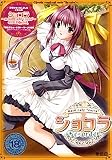
スリムアップスリムシェイクショコラ 360g
Amazon Vine 先取りプログラム メンバーによるカスタマーレビュー (詳しくはこちら)
以前からスリムアップスリムのカフェラテ味を愛用していますが、
このショコラ味も同じような使用感で、違和感なく使えました。 【使用感】 非常に溶けやすく使いやすいです。ホエイプロテインと違い、 シェイカーを使わなくても、コップとスプーンだけあれば十分に溶けます。 備え付けのスプーン2杯程度でも適度な満腹感があるので、食前に飲んで 食事の量を減らしたり、小腹が空く昼食から夕食までの間に飲むなどして、 食事制限に役立てています。 【味について】 カフェラテ味と同じく濃厚な味わいで、クセのようなものもなく 「ふつうに美味しい」です。ダイエット食品にありがちな、 そもそもおいしくないので食べた気がしない、食べたくなくて 続かない、といったこともなくて重宝します。 商品背面に水に溶かして飲むように指示されていますが、 しっかりとしたコクがあり、水っぽくなる心配もありません。 【注意点】 当然ながら、どのプロテイン食品にもカロリーはあります。 この製品は備え付けのスプーン3杯で160kcal弱です。 カロリーの多くをタンパク質(=プロテイン)が占めているとはいえ、 おいしくてカロリーゼロ…とはいかないので摂り過ぎにはご注意を。 また、これだけで三食を済ますといった無茶も厳禁ですね。 運動とあわせて、これをうまく活用して食事面のコントロールをすることで、 ダイエットの強いお供になると思います。 
NO REGRETS
6歳の双子の息子らが大好きなアルバム☆ 特に1曲目から4曲名までの流れが大好きとのこと。父親である私と全く同じである。 二世代を虜にした名盤。必聴です!

ショコラ [Blu-ray]
街並や人物の服装、キャラクター設定など
宮崎アニメを思わせるほのぼのとした雰囲気で、 美しくて楽しい良作でした。 観る前は「美味しいチョコがみんなを夢中にさせて、 めでたしめでたし。甘い物って不思議ね。」というくらいの話だと 思ってたけど、見進めるにつれてその認識が覆されていきました。 主題は、様々な事情をもった村の人達が、古い慣習や保守的な考えから 自分を解放し、成長していくという人間ドラマなのであり、 チョコレートはその「きっかけ」なのだと分かって、 奥行きのあるストーリーだなと感心。 もちろん、カップに「すじ」が残る程のホットチョコレートを始め、美味しそうなチョコ達がわんさか登場。それらを口にする村人の恍惚とした 表情にフフフと笑いが漏れます。 それぞれの登場人物もしっかり描れており、伯爵をはじめとして、 どこか憎めないキャラクターばかりで、人間味あふれるドラマに 仕上がっています。 
ショコラ ~maid cafe curio Re-order~
それぞれが魅力的で個性的なヒロイン達と鈍いけど真っすぐな主人公との物語はとても楽しめました。個人的には翠と大介との出会いなどを詳しくしりたかったです。
私は「パルフェ Reーorder」からプレイしましたが、同じようにショコラ未プレイの人に是非お薦めします。きっと違う視点でパルフェをたのしめますから。 
Chocolat
If you're caught in a bit of twix, with nothing to read, then may I suggest this excellent bounty? It is produced, not by Mars of Slough, but Joanne Harris of Barnsley, a chef who excels in the art of couverture chocolate. Step into her boutique, 'La Celeste Praline', and you'll be caught unawares by her classy wares. Chocolat is a novel of great sweetness, perfect for those who like their confictionary to be well milked. For readers with richer palates, however, Harris has also produced an intoxicating blend of dark chocolate, which is - dare we say it - extremely 'topic'al. If you're looking for a few delightful snickers, and not a lengthy marathon, then this is the novel for you. It's certainly richer and more exquisite than the most popular currency of chocolate bars.
Vianne Rocher arrives in the French village of Lansquenet during its carnival, a feast before the fast of Lent. With her is daughter Anouk (who seems to be named after a chocolate treat), and Anouk's companion, the mysterious Pantoufle. Joanne Harris tends to write a lot about alchemy in connection with cooking (see her excellent new novel, 'Blackberry Wine'), but Vianne Rocher would seem to have more than culinary skills at her disposal... This is especially apparent, though, in her delicious meeting with Armande Voizin, to which there is more than meets the eye. 'Pantoufle' refers to Charles Perrault's fairy tale of Cinderella, and as such, could be a subtle hint as to Vianne's true identity... It would seem appropriate here to compare Harris' work with that of Kate Atkinson, especially with regards to her new book, Emotionally Weird. Atkinson says that she has been trying to write a fiction with all the richness of Lewis Carroll's Alice in Wonderland. But it seems to me that Joanne Harris is more adept at writing fairy tales - her characterisation is stronger, certainly. Whilst Atkinson plays with words, Harris plays with thoughts and emotions. Chocolat is full of magic and fairy tales, from the realisation of a true Gingerbread house, to Vianne's use of Pagan cards and charms. It is holy appropriate then, that the conflict and drama within this novel stems from the masculine Church's opposition to Vianne Rocher and her culinary work. It even seems that that Joanne Harris could be engaging on a narrative in which God the Father and Mother Earth are the main combatants, featuring their eternal struggle as man and wife. Father Reynaud is the country priest who sees danger in Vianne's shop, and the novel is narrated in the first person by both of these antagonists. Reynaud relates his tale to the mysterious pere, whilst Vianne muses greatly on her long lost mother, with both 'parent' appearing to be flawed in some way. However, this struggle between the masculine and the feminine does not become too abstract, since Josephine Muscat has to bear the bruises in her role as battered wife. Chocolat has its fair share of romance, but also contains a swift punch of brutal reality. Like Blackberry Wine, Joanne Harris has decided to serve some home truths, along with the after dinner mints. The novel deals with thorny issue of immigration, currently a hot potato in Britain, and the problems of a population that is growing ever older. The Pope's recent apologies for the crimes of Roman Catholicism also resound within. These issues may be set in the exotic French countryside, but they still have relevance to us. Okay, so the richness of the carnivalesque and the mystique of magic realism have been added to the mixture, but their presence only serves to add depth, and never confusion. Vianne has a reluctance to see her fate in the stars, but this novel has won near universal admiration and is soon to be made into a film. It's a fiction that works on so many different layers, but like a particularly rich cake, there is something within it for everyone. The author uses simple words in her prose, but the combination of these coarse ingredients is explosive. Harris certainly knows how to play on our heartstrings, to make us feel for her characters. Current medical advice would certainly indicate that Chocolat could play a powerful part in releasing stress and lowering cholesterol. It's potent mixture: a benign, yet provoking stimulant that melts on the tongue. As for its aphrodisiac qualities, well, I can hardly say... But the only disappointment to be had from Chocolat is that it has to end. |

糖尿病予防やんちゃくまモン 天草地域糖尿病予防フォーラムに登場し、例のごとくさっそく悪ごろする 
コリー・ハート好きにならずにいられない 
センチメンタル・シティ・ロマンスうちわもめ - センチメンタル・シティ・ロマンス at 愛知県森林公園野音 
みなみ遥颯太と遥菜とみなみと先生 「スノボミドルターン対決」 
アイリーン・キャラIrene Cara - The Dream (Hold On To Your Dream) (RELAID AUDIO) 
白倉由美夢から、さめない 2nd season 『子猫ちゃんを連れて旅に出よう』 第2話 
高梨沙羅高梨沙羅 女子W杯ジャンプ第7戦 札幌連勝で今季7戦中、6勝目 2014-01-12 
黄金郷ブレイブフロンティア「土日ダンジョン 黄金の眠る地-黄金郷レベル3 攻略」 |
[動画|ゲーム|ヤフオク]
[便利|辞書|交通]
[ランキング|天気|メル友]
[占い|住まい|ギャンブル]
一週間で7kg減量!?「脂肪燃焼スープダイエット」スタート!
Magnolia Frogs
町山智浩がディストピア映画『ウォーリー』『THX1138』『未来惑星ザルドス』を語る
はなむけの歌
ショコラ ウェブ
